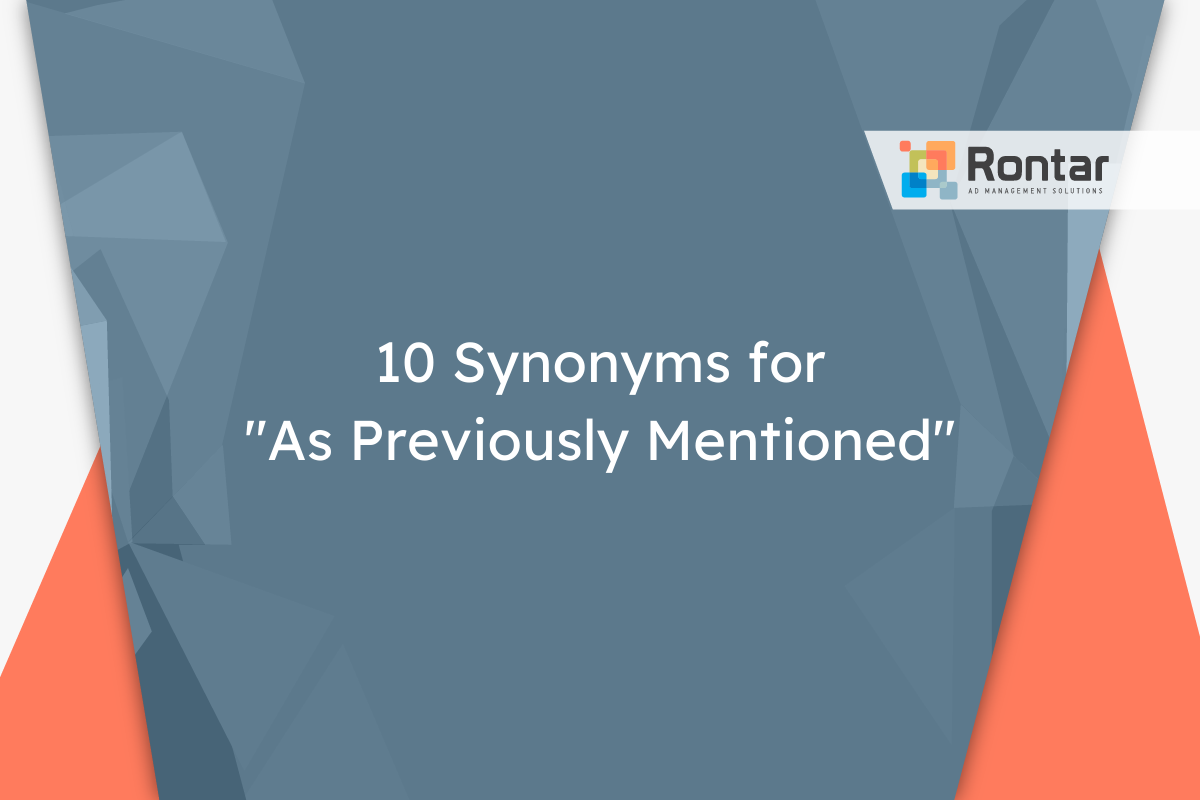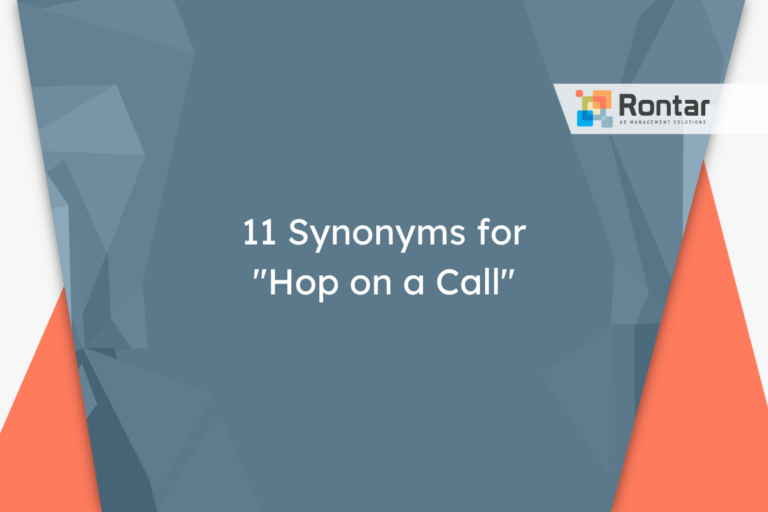10 Synonyms for “As Previously Mentioned”

In professional emails, it’s important to refer back to previous points or discussions without repeating yourself too much. “As previously mentioned” is a phrase often used, but there are many alternatives that can keep your emails feeling fresh and engaging.
This article provides ten different ways to refer back to earlier content, maintaining a professional and polite tone. Each alternative is explained with examples and suggestions on when to use them, helping you communicate more effectively in the workplace.
Is It Professional to Say “As Previously Mentioned”?
Using the phrase “as previously mentioned” can be considered professional, formal, and polite. It’s a respectful way to refer back to points you’ve already made, ensuring that the reader understands the connection between current and past remarks.
This phrase can be effectively used in various situations, including formal emails, reports, and presentations. We recommend it for when you’re communicating with colleagues, clients, or any recipients who expect a certain level of formality in communication.
Email example:
Dear Mr. Thompson,
I wanted to follow up on our earlier conversation regarding the project timeline. As previously mentioned, we are on track to complete phase one by the end of this month. Please let me know if there are any more details you need concerning this phase.
Thank you for your continued support.
Best regards,
Emily
Let’s look at the pros and cons of using “as previously mentioned”:
Pros:
- It helps remind the reader of key points without restating all the details.
- Conveys respect for the reader’s time by directly referencing previous discussions.
- Enhances clarity and understanding by linking back to earlier points.
Cons:
- It may come across as repetitive if overused within a document or conversation.
- Could be perceived as passive-aggressive or condescending in sensitive contexts.
Sometimes, you might want to use an alternative phrase to avoid repetitiveness or to soften your language, especially if you’re addressing a sensitive topic.
10 Other Ways to Say “As Previously Mentioned”
Here are ten common alternatives that carry the same meaning as “As Previously Mentioned” but can be used in a professional email to keep your language fresh:
- As mentioned earlier
- As highlighted before
- As stated previously
- As noted earlier
- Per our previous discussion
- Following our last conversation
- Referring back to
- In reference to our previous conversation
- Building on what was already discussed
- Reiterating our prior discussion
1. As mentioned earlier
This alternative is quite similar to the original phrase but comes across as a bit less formal. It’s straightforward and maintains professionalism without being overly formal. It’s a great synonym to use in emails where you’ve already introduced an idea and just need to bring it back into the conversation quickly.
This option is best used in professional settings where you already have a level of familiarity with the recipient. It works well in emails where clarity is important but the formal tone can be slightly relaxed. It is polite and efficient, especially for internal communication.
Example:
Dear Mark,
Just looping back to our discussion last week. As mentioned earlier, the deadline for submitting the report has been moved to Friday. Please let me know if you need any assistance.
Best,
Linda
2. As highlighted before
This synonym brings attention back to a previously stated point with emphasis, suggesting that it is not just a mere repetition but a significant mention. It’s slightly more formal than the original phrase and can add weight to the reminder.
Suitable for communications where you need to stress the importance of what was previously discussed, especially with recipients who require a nudge to recall or act on critical points. It’s a good fit for formal email correspondences, reports, or meetings where key points need reinforcement. It is also polite and professional.
Example:
Dear Susan,
As highlighted before, we must ensure all data entries are double-checked before submission. It's crucial for the audit next week.
Kind regards,
Greg
3. As stated previously
This alternative is directly interchangeable with “As Previously Mentioned” and maintains a formal tone. It clearly directs the reader’s attention to information shared earlier without changing the degree of formality. It’s a safe choice in professional settings.
We recommend this phrase for situations where you need to remind the recipient of a formal declaration or important point made earlier, such as in formal reports, official emails, or policy documents. It is suitable for communication with both internal and external recipients who expect a higher degree of formality and professionalism.
Example:
Dear James,
As stated previously, the team meeting is rescheduled for 10 AM on Thursday. Please adjust your schedules accordingly.
Best wishes,
Carla
4. As noted earlier
This synonym implies that the mentioned information was not only stated but also recorded or documented, adding a sense of importance and formality to the message. It is a professional way to recall a key point.
It is ideal for use in formal emails and documents where it’s essential to highlight that the information has been previously noted or documented. This alternative is particularly effective in professional settings, such as official reports or in communications where documentation and accuracy are important.
Example:
Dear Team,
As noted earlier, please ensure you complete your project status updates in the new system by EOD Friday.
Regards,
Emma
5. Per our previous discussion
This phrase is more formal and specific, indicating that the point of reference was from an actual conversation rather than written communication. It underscores the importance of prior discussions and agreements.
Best suited for follow-up emails or messages that refer to specific decisions or discussions from a meeting or call. It is particularly effective in professional scenarios where you are reminding or informing someone of outcomes or action items that were agreed upon in a prior conversation. A polite and clear way to refer back to verbal agreements or discussions.
Example:
Dear Helen,
Per our previous discussion, I have finalized the budget adjustments for next quarter. Let's review them together tomorrow.
Warm regards,
Peter
6. Following our last conversation
This alternative is less formal and more conversational. It smoothly transitions back to points made in a previous discussion in a way that is professional yet feels friendly and approachable.
It’s a great choice for emails or messages following up on a recent meeting or conversation, especially when communicating with colleagues or clients with whom you have a good working relationship. It keeps the communication polite while ensuring it doesn’t come off as overly formal or stiff.
Example:
Dear Felicia,
Following our last conversation, I've looked into the software you recommended, and it seems like a perfect fit for our needs.
Cheers,
Derek
7. Referring back to
This option suggests a polite return to a previously mentioned topic or point. It’s a bit more formal than “Following our last conversation” but still maintains a level of politeness and professionalism.
This alternative fits well in both written and verbal communication, where you need to draw the recipient’s attention back to a specific point or issue that was discussed earlier. It is highly effective in professional settings where clarity and reference to past discussions are essential.
Example:
Dear John,
Referring back to our discussion last week, I have updated the project timeline accordingly.
Sincerely,
Rachel
8. In reference to our previous conversation
This phrase is formal and explicitly states that the following information relates back to an earlier discussion. It’s useful for providing clarity and ensuring the recipient knows the context of the reference.
It works best in situations where you’re following up on detailed discussions or decisions made during previous meetings. This phrase is ideal for emails and documents in professional settings where you’re addressing matters that require clear documentation or a follow-up on previous agreements. It’s polite and respectful, ensuring the message’s tone is appropriate for a workplace environment.
Example:
Dear Benjamin,
In reference to our previous conversation, I have sent over the requested documents for your review.
Kind regards,
Monica
9. Building on what was already discussed
This alternative is a great way to not just reference past discussions but also indicate progress or additions to those points. It’s formal but suggests an ongoing, evolving discussion or project.
Suitable for emails or messages where you’re adding new information or developments to previously covered topics. This synonym is particularly useful in professional environments where projects or strategies are continually developing. It shows a forward-moving attitude while being polite and respectful of past conversations.
Example:
Dear Carlos,
Building on what was already discussed, I've added a few suggestions to the project plan for your consideration.
Best,
Anita
10. Reiterating our prior discussion
This phrase is a formal way to emphasize the significance of a previous conversation, suggesting that what follows is a crucial reminder or summary of that discussion. It is authoritative yet remains polite.
This alternative is highly suitable for professional communications where you need to strongly remind the recipient of previously agreed-upon points, decisions, or actions, especially in emails that aim to ensure accountability or prompt action on important tasks. It works well in both internal and external correspondences where clarity and a call to re-examine previously discussed topics are necessary.
Example:
Dear Samantha,
Reiterating our prior discussion, please make sure the team completes the client feedback survey by next Wednesday.
Best regards,
George
Final Thoughts
Choosing the right way to refer back to previous points in emails is key to clear and effective communication in the workplace. The alternatives provided here are designed to fit various contexts and levels of formality. By using these options, you can keep your messages professional and polite, while also ensuring they are engaging.






